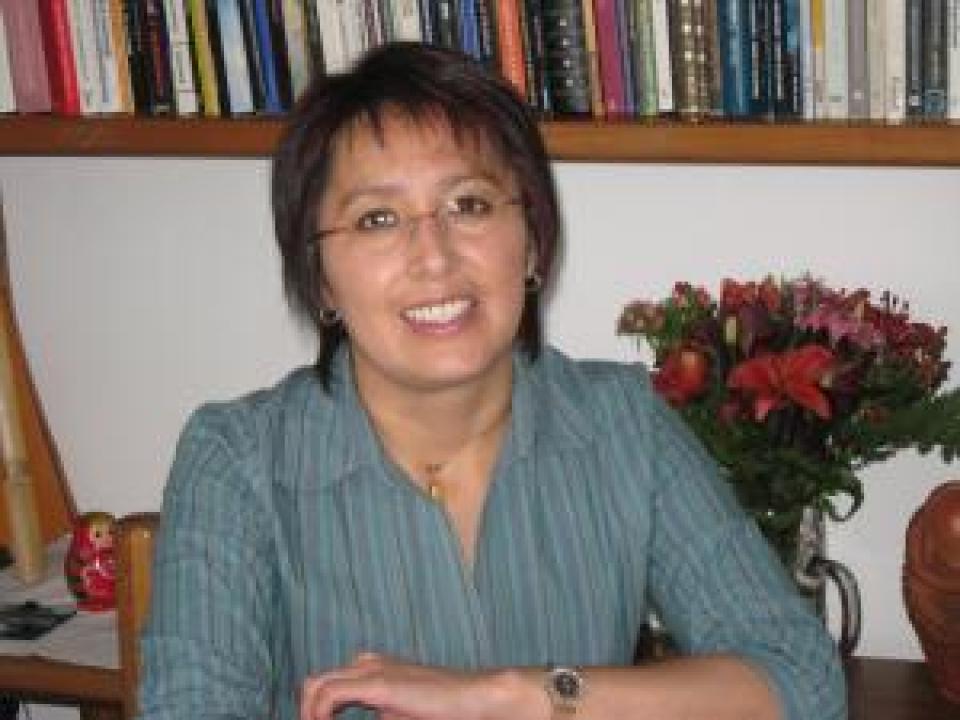
The Association for Progressive Communications (APC), in consultation with its partners, has submitted a report to the government of Ecuador which aims to contribute to the Universal Periodic Review (UPR) process which makes several recommendations about the relationship between the right to freedom of expression and access to the internet.
In this interview with Flavia Fascendini of GenderIT.org, Valeria Betancourt, manager of APC’s Communications and Information Policy Programme, argues that the incorporation of knowledge transfer through technology, connectivity for the information and knowledge society, and finally, inclusion and the guarantee of human rights within the broad strategies of Ecuador’s National Plan for Good Living for 2009-2013 represents an excellent opportunity for a structural consideration of women’s rights in relation to the internet.
Flavia Fascendini (FF): How was the Universal Periodic Review (UPR) submission to the Ecuadorian government prepared, and how were contributions collected? How will this process be continued after the submission of the document?
Valeria Betancourt (VB): It was rather a preliminary and specific undertaking. The hard work will come in Geneva in May, when the 2012 UPR takes place and the Ecuadorian government will be required to respond to concerns or comments about its performance in the area of human rights.
We saw that there was an opportunity to make a contribution in Ecuador since there were bills under discussion which we felt had a direct relationship to the question of access to the internet, such as the communications law. On the other hand, we saw there was a possibility of extending the collaboration we had established around the communications bill with some partner organisations in Ecuador, such as the Centro Internacional de Estudios Superiores de Comunicación para América Latina (CIESPAL) and Radialistas Apasionadas y Apasionados, to other areas more directly related to the internet.
We identified which areas should be covered by the recommendations and in the process of gathering information we found that one of the main instruments guiding public policy in Ecuador, the National Plan for Good Living for 2009-2013, does clearly incorporate the topic of access to the internet in some way. We therefore decided that it was appropriate to use this framework to focus our contributions.
FF: How can the topic of rights and the internet be introduced into a framework which tends to be rather more broad? And how can dialogue be established with other organisations which do not work specifically on internet-related issues?
VB: One advantage for us is Ecuador’s National Plan for Good Living which covers the period 2009-2013 and includes specific strategies which can be linked to questions about the internet. We therefore decided to make the most of the fact that these strategies have been put in place to make a direct connection to the issue of human rights and the internet.
The National Plan puts forward specific Objectives for Good Living, and Objective 2, which refers to “improving citizens’ capacities and potentialities”, sets a specific target relating to access to the internet: “to triple the percentage of homes with access to the internet by 2013”. This target represents a significant opportunity.
In reality, there has not yet been dialogue with government representatives and it is still early – but this is the next step to be taken and a goal has been set for May, when there will be discussions both with representatives of the Ecuadorian government and with representatives of other governments, who may raise some matters for Ecuador to respond to as part of the Universal Periodic Review. What we have done so far is to formally submit the recommendations to the government, specifically to the Ministry of Justice and the Ministry of External Relations, but unfortunately we have not yet received any feedback or response.
We aim to establish a dialogue with the government in May based on common objectives which present themselves. The government of Ecuador, for example, was present at the last meeting of the Human Rights Council in February when an expert panel on the issue of freedom of expression on the internet took place, and made rather an interesting intervention. This paves the way for us to be able to establish a dialogue around a topic which we understand to be of interest to the government of Ecuador.
FF: The report mentions areas in which you consider there to have been progress in Ecuador since the National Plan for Good Living was put in place. What is your assessment of how the plan has affected, or rather could affect, the rights of women on the internet?
VB: Although there has been some progress, more generally speaking I believe that a gender dimension is one of the gaps in public policy in Ecuador. It seems to me that this applies also to information and communication technology (ICT) policies. However I do believe that there is an opportunity given that the National Plan for Good Living proposes such a specific strategy related to the question of inclusion and the guarantee of rights.
This provides us with an appropriate framework to use when seeking to more strongly promote the incorporation of a gender perspective and an analysis of the ways in which women’s rights are limited or reinforced in relation to the internet. There is clearly an opportunity to incorporate these questions, since we know that we women have historically been overlooked in Ecuador, and the country is now pursuing some aspects with regards to public policy which enable it to approach this problem in a structural way.
In Ecuador there have been advances in the collection of information and the development of evidence which provides a picture of the specific situation of different social actors with regards to development, the exercise of their rights, and so on. We understand that one of the areas the government is working on relates to broadening the possibilities for greater gender equity.
This is an opportunity and I think that APC can play an important role, together with its peers, in proposing specific mechanisms and making concrete proposals to help in advancing on this path. I believe that using the UPR as a focal point allows us to raise awareness about how the rights of women are affected by the lack, or the existence, of this kind of policy.
FF: Brazil’s contribution to the UPR, for example, is much more explicit and emphasises questions concerning gender issues. It is also very clear on the question of sexual and reproductive rights...
VB: Yes, that is true. I believe that in the case of Ecuador it is important to highlight that there is the possibility of making such contributions in the future. It is important to try to exert an influence so that specific questions are posed to the government of Ecuador, in the context of the Universal Periodic Review, about the human rights of women on the internet, such as access to information about sexual and reproductive matters, or about plans regarding the inclusion of a gender perspective in ICT policies.
Our priority is the establishment of a dialogue with government representatives to explore the possibility of looking at and incorporating human rights on the internet as a default topic to be analysed by Ecuador in future reviews.
FF: In your opinion, what kind of instruments would be effective in raising awareness among women’s rights, gender and ICT activists of the importance of the UPR for their work?
VB: What we are trying to do here in Ecuador is establish direct contact with human rights organisations which have a long history of work in the country. We are interested, firstly, in learning about their experience in relation to the UPR since several of them have been involved in making recommendations to the UPR for a long time now, although they have not yet directly approached the topic of human rights on the internet. They have touched on other topics such as freedom of expression, but not in relation to the internet.
We are also contemplating contact with organisations, groups and activists which specifically work to promote and defend women’s rights. So we are trying to make these contacts so that we can join forces and explore whether we can agree on a joint agenda with regards to human rights on the internet. We are opting for this kind of direct dialogue because we believe it not only benefits us in relation to finding out about experiences of civil society participation in the UPR, but also permits a broadening of the agendas of the human rights organisations themselves.
FF: Drawing on your extensive experience in the area of human rights and the internet, if you had to identify a particular question of interest for the government of Ecuador to engage with or monitor in the area of gender and the internet, what would it be?
VB: I think that the question of access is fundamental when it comes to expanding the possibilities for women’s freedom of expression online, as a right which then permits the exercise of other rights. I think it is important to pay greater attention to how this matter, and how the possibility of exercising the right to freedom of association, as well as access to information and knowledge, is having a direct impact on women.
This would then make it possible to draw out the conditions which are necessary for women to be able to put forward our demands and our proposals more forcefully, and therefore make progress not only in the development of public policy but also in relation to strengthening the exercise of women’s rights on the internet.
FF: Thank you very much for talking to GenderIT.org, Valeria.
----end-----
The article is a part of APC's “Connect your rights: Internet rights are human rights” campaign financed by the Swedish International Development Cooperation Agency (Sida)
- 9138 views






Add new comment